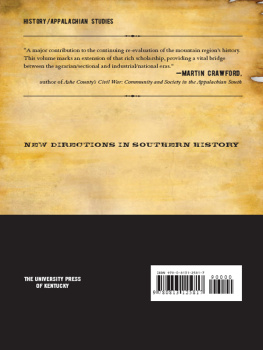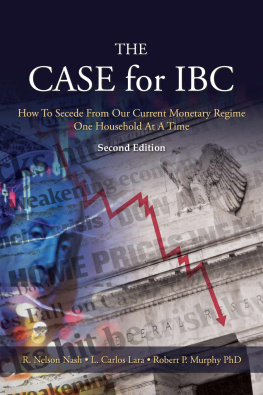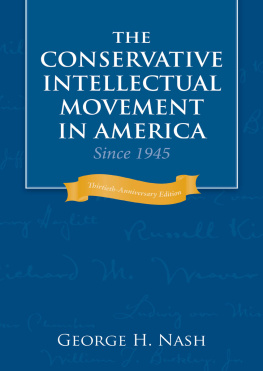Reconstructions Ragged Edge
CIVIL WAR AMERICA
Peter S. Carmichael, Caroline E. Janney, and Aaron Sheehan-Dean, editors
This landmark series interprets broadly the history and culture of the Civil War era through the long nineteenth century and beyond. Drawing on diverse approaches and methods, the series publishes historical works that explore all aspects of the war, biographies of leading commanders, and tactical and campaign studies, along with select editions of primary sources. Together, these books shed new light on an era that remains central to our understanding of American and world history.
Published with the assistance of the Fred W. Morrison Fund of the University of North Carolina Press
2016 The University of North Carolina Press
All rights reserved
Set in Arno by Westchester Publishing Services
Manufactured in the United States of America
Portions of chapter 3 were published in The Other War Was But the Beginning: The Politics of Loyalty in Western North Carolina, 18651867 as part of Andrew L. Slaps Reconstructing Appalachia: The Civil Wars Aftermath and are used here with the permission of the University Press of Kentucky.
An earlier version of chapter 4 appeared as Aiding the Southern Mountain Republicans: The Freedmens Bureau in Buncombe County, North Carolina Historical Review 83, no. 1 (January 2006).
The paper in this book meets the guidelines for permanence and durability of the Committee on Production Guidelines for Book Longevity of the Council on Library Resources.
The University of North Carolina Press has been a member of the Green Press Initiative since 2003.
Cover illustration: Registration at the SouthScene at Asheville, North Carolina, Harpers Weekly, September 28, 1867 (courtesy of Harpweek)
Library of Congress Cataloging-in-Publication Data
Nash, Steven E., author.
Reconstructions ragged edge : the politics of postwar life in the southern
mountains / Steven E. Nash.
pages cm. (Civil War America)
Includes bibliographical references and index.
ISBN 978-1-4696-2624-6 (cloth : alk. paper) ISBN 978-1-4696-2625-3 (ebook)
1. Reconstruction (U.S. history, 18651877)North Carolina, Western. I. Title.
II. Series: Civil War America (Series)
F259.N37 2016 975.604dc23
2015017856
For my parents, Brenda and Carl
Contents
CHAPTER ONE
Setting the Stage: Antebellum and Civil War Western North Carolina
CHAPTER TWO
Mountain Masters without Slaves: The Aftermath of Slavery, 18651867
CHAPTER THREE
Great Time for the Tories and Negroes: Loyalty, Race, and Power, 18651868
CHAPTER FOUR
Agents of Change: The Freedmens Bureau, 18671868
CHAPTER FIVE
Every Thing That the Devil Can Suggest: Klan Violence and the Republicans Failure, 18681872
CHAPTER SIX
The Beginning of a New Mountain South: Agriculture, Railroads, and Social Change, 18721880
Tables and Maps
TABLES
1 African American Population in Western North Carolina Counties, 1860
2 Registered Voters in Western North Carolina Counties, 186768
3 Gubernatorial and Constitutional Election Results in Western North Carolina Counties, 1868
MAPS
1 Western North Carolina Counties and County Seats, 1870
2 African American Population in Western North Carolina, 1860
3 Western North Carolina Railroads, 1870s1890s
Acknowledgments
During the time I spent working on this project, I heard many different metaphors for writing a book. Among my favorites are It is not a sprint; it is a marathon and It is like a child that you raise, then send off into the world hoping that others see the same beauty in it that you do. Whichever metaphor you may prefer, the simple fact is that no work of this lengthin time and pagescan be accomplished alone. It takes a village, so to speak.
The debts that I owe John Inscoe transcend academics. His patience, kindness, and friendship made every stepeven the less certain onesfrom graduate student to professional historian easier. His faith in me and this project never wavered. In my opinion, he ranks among the very best of us who are fortunate to call ourselves historians. He is a shining example of a principled scholar who is also a great colleague and an even better person. This projectto say nothing of me as a scholar, teacher, and personis better thanks to Johns influence.
Peter S. Carmichael took a raw masters student and taught him to write. I thank Pete for teaching me how to be a professional historian and to appreciate economy in prose. Most importantly, Pete instilled in me the belief that being a historian is a job like all others and to always remain humble.
After Pete taught me to write, Stephen Berry taught me how to rewrite. Steve joined this project at an early stage, and I am lucky that he did. Not only does he have a talent for careful, complex analysis, but, for my money, he is one of our professions best writers. From him, I have managed to discover more of my own authorial voice and embraced the freedom to push conventions a bit. Others who offered me guidance included Ronald Butchart, Paul Sutter, and James Cobb. Ron is a foremost authority on the Freedmens Bureau and education, and he shared his insights with me graciously. Paul introduced me to environmental history and supplied several useful thoughts that helped make this a better book. If anyone knows more about the U.S. South than James Cobb, I have never met that person. His scholarship, his support, and his critical assessment of my work have made me a better historian.
Working with the staff at the University of North Carolina Press has been a dream. Series editor Aaron Sheehan-Dean went out of his way to keep me in the loop at every step of the process. Once I began working directly with the press, Mark Simpson-Vos was a huge help. I flatter myself by thinking I may have been a low-maintenance author, but every first-time author has questions and concerns, and Mark and his staff answered each one with unflagging enthusiasm and alacrity. Aaron Sheehan-Dean and Aaron Astor served as the readers for the press, and I cannot say enough about their feedback. All you can ask as an author is that your readers give your work a close, careful read. They did more than that; both of them also offered significant ideas for how to improve the book and I thank them for it.
A number of scholars provided valuable feedback at conferences and other meetings over the years. Paul Escott, William Barney, Gordon McKinney, Ronald Eller, Kathy Newfont, David Whisnant, Anne Mitchell Whisnant, Kevin Young, Sam McGuire, Luke Manget, Darin Waters, Dan Pierce, and Richard Starnes all offered suggestions and ideas. I appreciate their thoughts about how I could improve this book and their support at the various stages of this project as well.
Archivists at the University of North Carolinas Southern Historical Collection, the North Carolina Office of Archives and History, Duke University, Appalachian State University, and the National Archives made researching this project a delight. I greatly appreciate their time, helpfulness, and patience as I slowly figured out what it was that I needed.
Various friends and colleagues also deserve mention. Bruce Stewart has been a roommate, a writing critic, and a best man for me at different stages of this project. He has read sections of this book, and his comments as well as his own work on western North Carolina have been invaluable. I have known Barton Myers since he was an undergraduate, and I dare say that his enthusiasm for and commitment to Civil Warera scholarship have only grown over time. Judkin Browning, Min Song, Ichiro Miyata, Lain Hughes, Chris Manganiello, Bert Way, Mary Ella Engel, Justin Nystrom, Aaron Safane, David Cotton, and others made Athens a special place. Finally, a special mention to my beloved Beer Team: LaShonda Mims, Jim Gigantino, Jenny Schwartzberg, Jennifer Wunn, Zac Smith, Kathi Nehls, and Tammie Rosser. You are the best. I value your friendship, respect each of you deeply, and admire the way that you have kept Jason Manthornes memory alive. For the uninitiated, Jason was the best of us (hence Beer Team captain). He left a huge void that many of you might never recognize but we feel every day.










